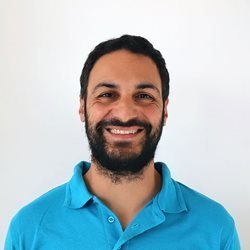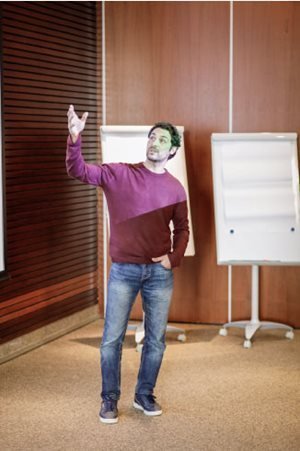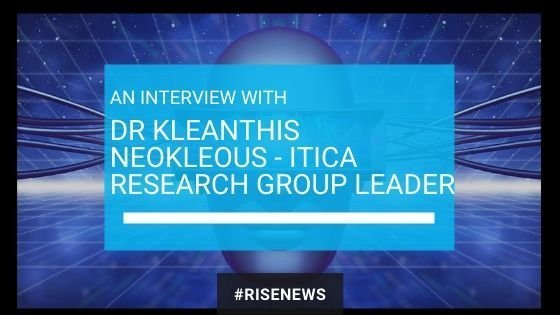Dr Kleanthis Neokleous graduated from the University of Cyprus in June 2011, with a Doctorate in Computer Science and has a multi-disciplinary academic background in various fields including Virtual Reality to Space Science and Technology.

He has several years of experience in project management and he was involved with the conception, design, preparation, writing and coordination of many National and EU research projects. During and after his PhD, Dr Neokleous co-founded in parallel two innovative startup companies in Virtual Reality technologies and eHealth applications in line with his academic and research interests.
Since June 2019, Dr Neokleous is employed at the first Research Centre in Cyprus focusing on Interactive media, Smart systems and Emerging technologies (RISE) as the ITICA (Immersive Technologies for Intelligent and Creative Applications) Multidisciplinary Research Group Leader.
1. What was your initial goal when ITICA was created and which is the biggest challenge you faced in achieving that goal?
The primary goal of ITICA is to work on projects that include scientific research in the wider field of immersive technologies with special emphasis on creative and innovative projects that focus on the combination of arts, technology and science.
I strongly believe that using interactive media, smart systems and emerging technologies in synergy with arts can produce remarkable outcomes with significant impact on the social and economic development of Cyprus. One of the biggest challenges would be to find the means to exploit the innovation and scientific potentials, when combining elements from the creative industries with the research work and expertise of our MRG.

2. As the leader of the ITICA MRG, in which way do you picture your research group’s work benefiting the local community?
It is widely accepted today, that artists and creative professionals play an important role in innovation and science and this is reflected to our society. Culture, arts, and creative industries are fundamental components for the European Union’s economic development with significant impact in wellbeing, active citizenship, common values, social inclusion and intercultural dialogues development. The way I see ITICA contributing, not only in the local community, but also to the Eastern Mediterranean and Middle East region in extend, is by: a) gradually building a group of multidisciplinary researchers with a range of expertise mostly from the fields of AR/VR technologies, machine learning, cognitive psychology, architecture and digital arts and b) working on projects with a network of renowned international partners in the fields of Arts and Technology.
. What has been the biggest obstacle you have come across in your effort to bridge the gap between arts and technology?
Arts and technology is not a new concept. There are many research centres in EU that successfully managed to produce high level scientific research and innovation by combining elements of fine arts with emerging technologies for more than 40 years. One of the most prominent examples is Ars Electronica (https://ars.electronica.art/news/en/) in Linz, Austria which we started collaborating with. Ars Electronica promotes the collaboration between artists, scientists, engineers and tech enthusiasts with some very creative and innovative outcomes, and as stated in their website, “the ideas circulating in Ars Electronica are innovative, radical, and eccentric in the best sense of that term”.
It is always a challenge when you try to combine two seemingly different concepts, thus, gradually integrating a more holistic approach that promotes ecosystems where cultural and creative industries co-exist with scientific and research institutions, would be the biggest obstacle in my opinion.
4. You were engaged with the RISE project since it was only an idea, looking at how far the centre has come since then, what are you most proud of?
I was fortunate to see how RISE gradually evolved from an idea, to a dynamic centre in the heart of Nicosia. It is remarkable how fast the centre has expanded over the past two years. Of course, there is still work to be done. Yet, I know that there is a powerful and coordinated effort from all RISE members and soon the efforts of RISE to contribute in the social and economic development of Cyprus will be recognised, and as a small part of RISE, this is something that I will mostly be proud of.
Don’t forget to bookmark this blog, email to a friend/colleague or sign up to get instantly notified on every new blog post. Of course, we’d love getting your feedback — and what you want to see discussed (and showcased) in the future.

